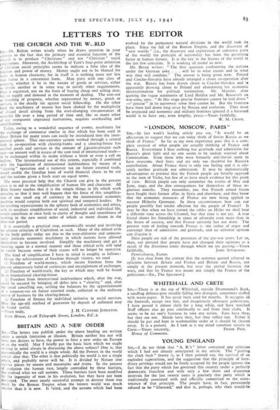"LONDON, MOSCOW, PARIS"
SIR,—In last week's leading article you say, "It would be an affectation to suggest that we can today think of Soviet Russia as we think of France." So far as my own experience goes this is a com- plete reversal of what people are actually thinking of France and Russia. Everywhere I hear nothing but gratitude and admiration for Russia's great fight and no one seems to be unduly worried about Communism. Even those who were formerly anti-Soviet seem to have overcome their fears and are only too thankful for Russia's contribution. About France there is only one feeling and it is cer- tainly neither gratitude nor admiration. It may be diplomatically advantageous to pretend that the French people are bitterly opposed to the men of Vichy, but few of us have much evidence for this point of view. British people can only remember the events of May and June, 5940, and the dire consequences for themselves of those in- glorious months. They remember, too, that French armed forces have fought their former allies in Syria and elsewhere, and they know that the economic resources of France are now being applied to succour Hitlerite Germany. In these circumstances how can our people possibly feel tender affection for the people of France? It may be that when we have turned the tables on Hitler we shall hear a different tune across the Channel, but that time is not yet. A true friend shows his friendship in times of adversity even more than in the hours of success, and that France certainly has not done. The present state of feeling towards France is one rather of anger and contempt than of admiration and gratitude, and no editorial opinion can disguise it
Most people are sick of the pretences of the pre-war years. Let us, then, not pretend that people have not changed their opinions as a result of the disastrous times through which we are passing.—Yours
Pennsylvania, Exeter.
[It was clear from the context that the sentence quoted referred to relations between Britain and France and Britain and Russia, not simply at the present moment, but over the period between the wars, and that by France was meant not simply the France of the politicians.—En., The Spectator.]


























 Previous page
Previous page